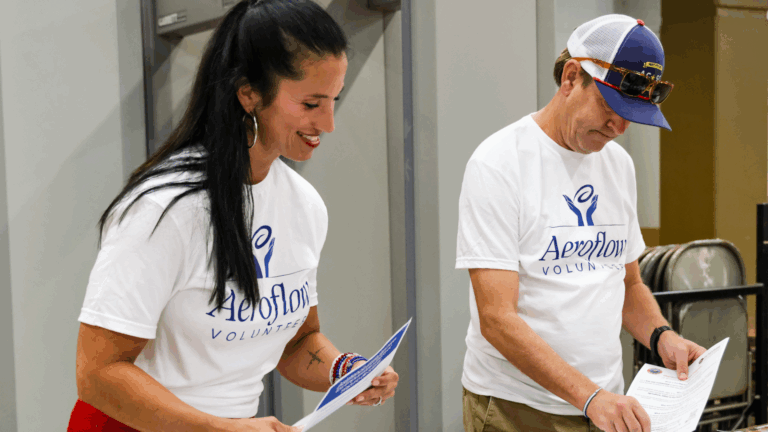This content has been reviewed for accuracy by Mike Cantor, Chief Medical Advisor at Aeroflow Health.
Dive into our blog inspired by our webinar, “The Silent Struggle: How Health Plans Can Champion Mental Wellbeing,” to look into the potential situational stressors and risk factors that could be leading to an increase in mental health conditions within your member population. For more comprehensive insights, don’t miss the chance to watch the webinar playback.
Table of Contents
Aeroflow Health has observed that the maternal continuum of care is often incomplete. What has traditionally been missing from the model of care?
Jennifer: That’s such a great question! It is an honor that Aeroflow is often a first stop for new moms when they find out they are pregnant. Typically, moms decide to breastfeed very early on in the pregnancy journey, so we’re in contact with them, possibly before they even have the confidence to share the news with the rest of the world. We’re able to have this unique experience where we can walk with a mom through her first prenatal visits, help give direction on breast pumps, and provide classes, education, and support groups where she can connect with other moms. Our hope is to give her confidence in voice and preparation through our classes and education. Breastfeeding is natural; however, breastfeeding is not easy. I am a former breastfeeding mom, and it really is a lot of work and dedication that you have to put in, and even with preparation, there will be bumps and struggles along the way. Often, we will spend a lot of time preparing for the actual birth event but not as much time really thinking about other factors that we will need to put into practice once the baby is at home. We leave the hospital, and typically, we are faced with a multitude of hormones, lack of sleep, and relentless self-doubt questions about whether or not we’re meeting all of the needs of our baby. The 6-week postpartum check-up is often a moment of relief for new mothers. Concerns can be addressed, and the initial “fog” of those early newborn days can start to clear. However, a hidden danger lurks in this tradition: the significant gap in care between delivery and that 6-week appointment. For many mothers, this means six weeks without essential medical and emotional support during a critical time of adjustment and potential health risks. I am so deeply proud of how Aeroflow has stood in the gap for moms during this period of time. Through the help of our IBCLCs and our community of educators, we’ve been able to implement a Facebook Group called The Pumping Room, where moms are given the space to bring their questions and concerns and be met with a community that is willing to listen and help provide a path to success. With health plans, there’s an opportunity for us to really partner in triage and assist some of these moms who may be some of the most vulnerable populations. Health plans, unfortunately, aren’t privy to some of the information that patients are sharing with us at Aeroflow, so if we’re able to partner together and share the wealth of knowledge, we’re more likely to see higher success.
When it comes to mental health, what aspects of care have been missing in maternal care? How important is mental health for pregnant people, and how does Canopie provide a solution?
Anne: The experience of motherhood usually has 2 disconnected pieces. The more clinical side, where a mom will visit her OB, and then the community side, where she seeks support and answers to her questions. These pieces are so interrelated. What happens outside of the doctor’s office impacts what is discussed in the doctor’s office and vice versa. The truth is that maternal health is often treated in siloes. One of my favorite things about Aeroflow is how they truly have figured out how to fill important support gaps in a trusted, evidence-based way at a population level. Mental health conditions are the most common complications during pregnancy and childbirth, and often, can be the most devastating in terms of cost and the long-term impact on mom and baby. Sadly, in the traditional maternal care model, moms won’t talk about mental health with their doctor until postpartum. This is a huge loss as there is so much that moms can do to protect themselves throughout their pregnancy. We know that certain people are at higher risk during pregnancy, and although they may test low on the depression screeners done through their provider, we’ve seen at Canopie that these same people are experiencing a lot of anxiety, which can be a precursor to developing postpartum depression. Moms who get pregnant older, undergo IVF, are pregnant with multiples, or even someone with a history of mental health conditions are all subject to increased mental health risks. What’s really missing is proper screening. According to the Policy Center for Maternal Mental Health, despite the availability of scalable mental health condition solutions, less than 20% of all moms are screened for mental health conditions. Additionally, we need to be more proactive about the support we provide people because it can be so hard to access mental health support, no matter where a mom finds herself. We’re so grateful to be able to partner with Aeroflow to offer moms proactive mental health support and education that engages them with the care they need.
Health plans often have maternal care management programs. What do these programs typically do?
Ryan: More broadly, health plans are wanting to identify and have as many touch points with mom as she is walking through her pregnancy journey. This is where Aeroflow in combination with Canopie can step in to help monitor moms in their mental health as well as help identify high-risk moms.
Anne: Unfortunately, I have seen that most people do not know about the wonderful support that is available to them through their insurance. I’ve found that nurses really are a triage of support for moms as they navigate their needs and questions through the perinatal period. One of the things that Canopie and Aeroflow have done together is increase awareness of these programs for expecting moms. When we work with health plans, they typically are interested in reaching specific zip codes where they know that there are higher barriers to access to care. We help educate health plan members and provide identification for those whom health plans should have a heightened awareness of.
Recently, Aeroflow Health and Canopie partnered with a prominent Florida health plan to provide a maternal mental health program for members during their pregnancy journey. What did the risk stratification look like for this program? What were the key components of identifying members for this program?
Anne: I am so excited about this part of the work because it was an acknowledgment of how interrelated these issues are. Those who have increased determinants of health barriers have a higher risk of mental health conditions. Moms who have a high pregnancy risk are also at higher risk, and vice versa. Moms who have an untreated mental health condition are 3 times as likely to have a preterm birth. In addition to asking key social risk factor questions, we were able to segment member communication strategies between health plans, the DME provider and care management teams so that the full timeframe of needed care was covered. One major success was the amount of data we were able to gain from each mom. The self-reported information from members helped fill some gaps that wouldn’t have otherwise been available to the health plan. I will also add that trust was a huge part of the stratification process. In a world where information overload is rampant, being able to be a trusted resource that moms can look to is huge.
One of the challenges that health plans have is patient engagement. Aeroflow has had several successes with engaging with members. Can you share some of those?
Jennifer: I love this question because it has been what Aeroflow Breastpumps has focused on since day one. We’ve always believed that if we created our experience centered around the birthing parent, we would create an experience they want to be a part of. We’ve created simplicity to care and access. Birth may be the first major medical event that someone is going through, so navigating insurance can be really difficult. We are able to truly simplify the insurance process and do all of the leg work for moms so that they can focus on things like lactation education and breastfeeding support. Through resources like our Facebook group and other social channels, we are regularly talking with members. Our team of 50+ loving clinicians and customer service teams are available to moms if they want to email, call, or chat. We’re here to communicate with moms using their preferred method. We want to meet moms where they are in a fun and relatable way. We want every person who comes to our website to feel like we are wrapping our arms around them, no matter what health plan or health benefits they have.

Michael Cantor, M.D.
Dr. Mike Cantor is a geriatrician and attorney who has extensive experience designing and implementing value-based care, quality improvement, and care management programs for healthcare providers and health plans. He works as a fractional (part-time) Chief Medical Advisor for Aeroflow Healthcare, Uber Health, and other technology-enabled health services companies, value-based care organizations and digital health companies. Previous roles include: CMO for Bright Health Plan, an innovative health
insurer; CMO for CareCentrix, a leading outsourced home health, durable medical equipment, and post- acute care benefits manager recently acquired by Walgreens; and CMO for the New England Quality Care Alliance (NEQCA), the physician network affiliated with Tufts Medical Center, where he implemented network-wide quality improvement and care management programs for 150,000 managed care lives. He trained in internal medicine at Beth Israel Hospital in Boston and did his geriatrics fellowship at Harvard Medical School. He has degrees in law and medicine from the University of Illinois.

Ryan Bullock
Ryan serves as Chief Strategy Officer at Aeroflow Health, a premier nationwide provider of durable medical equipment. In his current position, Ryan oversees strategic operations, corporate development and government relations. For over 14 years, Ryan has provided exceptional leadership, management and vision to Aeroflow, resulting in incredible growth and profitability for the company. Ryan holds a Bachelors of Science degree in Electronic Engineering from Western Carolina University and resides with his family in the beautiful mountains of Asheville, North Carolina.

Anne Wandlund
Anne is the Co-Founder and CEO of Canopie, a maternal mental health platform providing access to care for perinatal populations across all levels of mental health and social risk. Before Canopie, she spent 5 years leading maternal health organizations in East Africa, most recently as the COO of an award-winning social enterprise that uses technology to improve maternal and child nutrition. She has worked in global health for the State Department, USAID, and Massachusetts General Hospital and has a Master's degree from Tufts University, where she served as a bioethics Teaching Fellow at the Harvard School of Public Health. Anne is channeling her passion and expertise in maternal health and personal experiences with mental health conditions as a new mom to address the enormous care gap.

Jenn Jordan
Jennifer Jordan serves as the Vice President of the Mom & Baby Division at Aeroflow Health. With a passion for building brands and shaping strategic visions, Jenn has propelled Aeroflow Breastpumps to new heights in the competitive healthcare market. Leveraging her extensive experience in marketing, customer experience, sales and operations management, she has overseen the expansion of Aeroflow Breastpump's reach, forging key partnerships and driving growth in the maternal health space.




